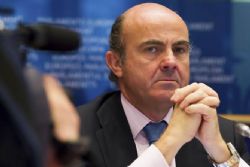- Business
- Childbirth & Education
- Legal Formalities
- Motoring
- Other
- Pensions & Benefits
- Property & Accommodation
- Taxes
- Airports and Airlines Spain
- Paramount Theme Park Murcia Spain
- Corvera International Airport Murcia Spain
- Join us for Tea on the Terrace
- When Expat Eyes Are Smiling
- Meet Wincham at The Homes, Gardens & Lifestyle Show, Calpe
- QROPS 2014
- Spain Increases IHT in Valencia & Murcia
- Removals to Spain v Exports from Spain
- The Charm of Seville
- Gibraltar Relations
- Retiro Park : Madrid
- Community Insurance in Spain
- Calendar Girls
- Considerations when Insuring your Boat in Spain
- QROPS – HMRC Introduces changes that create havoc in the market place
- QROPS – All Change From April 2012
- Liva & Laia : 15th November

The government is sticking to its forecast of a contraction in GDP of 0.5% this year despite estimates by the IMF and the European Commission that put the figure at almost triple. The economy is estimated to have shrunk 1.5% last year when unemployment moved above 25%.
De Guindos said that if the labor reforms introduced by the PP government had been applied earlier there would have been one million people fewer out of a job.
"No country has suffered the destruction of jobs that Spain has," the minister said. "That is why the first priority was labor reform. Unemployment increased because you won't see the effect [of the reform] immediately, but it has managed to halt the impact of the economic slowdown from the point of view of employment. It we had had this labor reform 2 or 3 years ago, we would have saved a million jobs," he added.
According to figures from the INE, the number of people out of work at the end of Q3 stood at 5.778 million. Experts expect this figure to move above 6 million this year, when the jobless rate is forecast to top 26%.
De Guindos said he expects the economy to continue to contract in the first half of the year before growth turns positive in Q3. "The foundations are being laid for there to be positive job-creation rates in Q4," he added.
The minister said the government is still weighing up whether to seek assistance from the European Stability Fund in order to trigger Spanish sovereign bond purchases by the ECB in the secondary market and reduce the country's borrowing costs.
"The decision has to be the right one and at the right time," he said. "This thing about the bailout is not like pushing a button, and by pushing this button funding conditions immediately improve," he added.
"There are many implications and the government needs to consider these implications overall in order to do what is best for Spain's interests."










